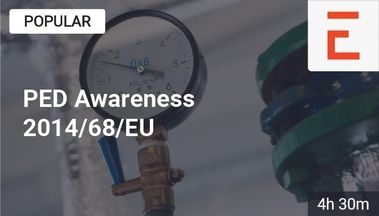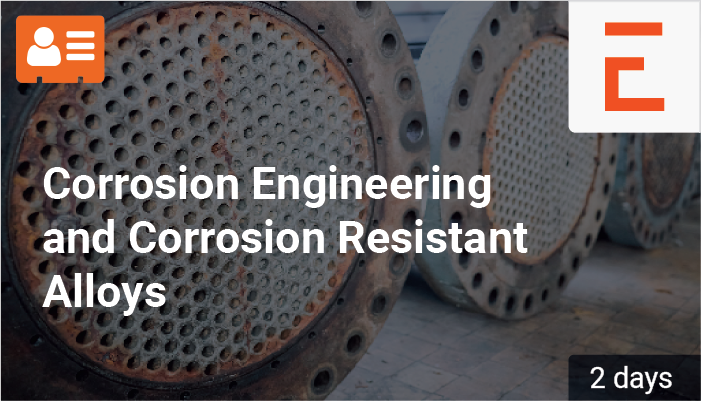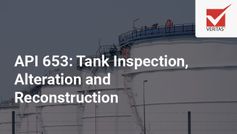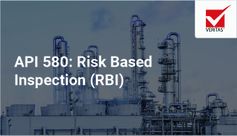Industrial Microbiologically Influenced Corrosion
Join the Program
Price: €1500
Registration deadline: 15 July 2024
21hr Content/4 day program
30 Credits
Tesfa Haile PhD
VILT4001
Format:
Instructor-led
"Dates and Payments will be arranged with you after the registration deadline. Register today!"
Join the Program
To register multiple team-members at once, use the link below.
Need a dedicated version of this program for your team? Please contact us.
Course Objective
“To teach engineers how to diagnose MIC threats, implement mitigation strategies, and avoid catastrophic failures.”
Private course for team
Custom scheduling
Industry Expert
On-site or virtual
1-year access
to course material
PDH Hours qualified course
Read more here
About the course
Instructor-led
Live sessions
21hr Content
Registration deadline
15 July 2024
English
VILT4001
Microbiologically Influenced Corrosion (MIC), also known as bio-corrosion, is the corrosion of metals and degradation of non-metallic materials because of the metabolic activity of microorganisms. Many industries are known to be affected by MIC, including oil and gas, water and wastewater, and nuclear power plants, among others.
This 3-day MIC course aims to provide engineers with a thorough understanding of the causes of microbiologically influenced corrosion, its recognition, treatment, mitigation, testing and monitoring, and prevention. Upon completion of this training course, the participants will be able to identify the different forms of corrosion damage caused by different types of bacteria, the mechanisms of MIC in different industries and apply appropriate strategies and methods to mitigate systems affected by MIC. Guidelines for MIC field sampling and testing to assess the susceptibility of systems to MIC also form part of the syllabus.
The course consists of 21 hour of online live sessions with the instructor. All training content is provided through your EngineeringTrainer account.
After the course you maintain 1-year unlimited access to the course, including any new course material. This allows you to perform modules again should you need to refresh your knowledge.
Meet your instructor
Dr Tesfa Haile
Managing Director of Genesis Data Solutions
Microbiologically Initiated Corrosion, Project Management
Program & Details
1. What is corrosion?
2. Definition of corrosion terminologies
3. Basic concept of corrosion
4. Types of corrosion
5. Cost of corrosion
6. Factors influencing corrosion
1. What is MIC?
2. Electrochemical versus non-electrochemical biocorrosion/biodegradation
3. Environmental factors influencing MIC
4. Role of bacterial in MIC
- SRB (do a bullet point sub-list Beni)
- APB
- IRB
- IOB
- NRB
- Methanogens
- General aerobes and anaerobes
5. Implications of MIC
6. Group discussion
1. Importance of MIC testing and monitoring
2. Field
- Culturing method
- Direct methods
- Molecular Microbiological Methods
3. Laboratory
- Culturing method
- Direct methods
- Molecular Microbiological Methods
4. Online sensors
1. Introduction to MIC sampling
2. Liquid Sampling
3. Solids sampling from Pigging operations
4. Sampling from internal pipeline surfaces and corrosion coupons
5. Sample shipping
1. Mechanical cleaning
2. Biocides application
3. Cathodic Protection
1. Factors that influence MIC for Modeling consideration
2. Prediction approaches
3. MIC-Compass
4. Haile et al. development stage
1. Oil and gas pipelines
2. Sewer systems
3. Nuclear power plants
4. Fire sprinkler systems
5. Anaerobic digesters
6. Drywalls
7. Others: Group discussion
1. Cast Irons, Carbon Steels and Low Alloy Steels
2. Stainless Steels and Alloys
3. Nickel and Nickel Alloys
4. Copper and Copper Alloys
5. Aluminium and Aluminum Alloys
6. Zinc and Zinc Alloys
7. Others: Group discussion
1. Accelerated General Corrosion
2. Rapid Through Wall Pitting or Perforation
3. Tubercle Formation
4. Others: Group discussion
1. MIC Case Studies
2. MIC future prospective
3. Open Discussion
Results
After this course, you...
will have learned about different types of microorganisms and their corrosion mechanisms applicable to various industries including the oil and gas, and water and wastewater industries, and understand the specific conditions that promote MIC.
understand the various field and laboratory MIC Monitoring Techniques such as culture methods, direct methods, and molecular microbiological methods (MMM) and how these can be used in practice.
know how MIC can be prevented or mitigated through mechanical cleaning, chemical application, and cathodic protection.
have seen several detailed MIC case studies; to understand the causes of corrosion incidents, their consequences, and the lessons learned.
have the skills to play a proactive role in managing MIC risks in your facility.
have enhanced your professional competence in microbiology, materials science, and engineering.
Who should attend this course
Those looking to learn about MIC and how to manage it in industrial situations:
Engineers and Technicians; Asset and Facility Managers
Inspection and Maintenance Personnel
Health, Safety, and Environment (HSE) Professionals
Project Managers and Consultants
Regulatory and Compliance Personnel
Prerequisites:
No experience with MIC is required.
A basic understanding of Microbiology and General corrosion is beneficial.
Level: Intermediate
This course consists of 21hr of instructor-led live sessions which consist of presentations, demonstrations, discussions and worked cases. During each session, participants can ask questions to the instructor (through the chat or microphone) which will be answered in the session.
Access to the course
After signing up for the course, EngineeringTrainer will be in touch shortly after the Registration Deadline to agree a training schedule that is possible for the participants and instructor. Payment will also be arranged at this stage after the Registration Deadline.
Once the training schedule is agreed, you will find the course welcome chapter and instructions on how to join the live sessions in your EngineeringTrainer portal.
Sessions are held using the software Microsoft Teams and a log-in link is provided for each session through the EngineeringTrainer portal. Live sessions can be joined using any device, including tablets and mobiles.
There is a Registration procedure for this training course. Please click on the register button above to register.
Shortly after the Registration Deadline has passed EngineeringTrainer will be in touch to agree a training schedule which is possible for you, typically within 2 months of the Registration Deadline.
No payment is required until after the Registration Deadline. Payment will be arranged together with the schedule after the Registration Deadline.
Typically the course will be split across 7 sessions, an example is shown below, the final dates and schedule of the training course will be determined together with the instructor and the participants after the Registration Deadline :
Session 1 3hr
Session 2 3hr
Session 3 3hr
Session 4 3hr
Session 5 3hr
Session 6 3hr
Session 7 3hr
These sessions will include breaks at regular intervals
After the course participants receive 1-year unlimited access to the slides and exercise documents used within the sessions via the learning portal. This allows them to review material when required to refresh their knowledge for daily work activities.
A personal digital certificate will be made available to each participant upon full attendance.
Example Certificate:
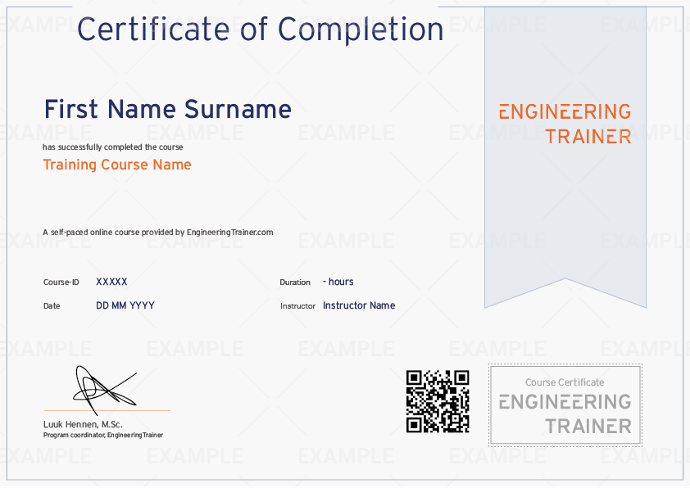
FAQ
This course consists of instructor-led live sessions which consist of presentations, demonstrations and discussions of questions. During each live session participants can ask questions to the instructor (through chat or microphone) which will be answered.
Please note that for privacy reasons no recordings of the live sessions are made or provided.
The training material used in the live sessions, for example the slides or exercises, will be available in the EngineeringTrainer portal for a year after the date of the training allowing you to refresh your knowledge or review material if needed.
No, course content is not available for download.
The training material used in the sessions, for example the slides or exercises, will be available in the EngineeringTrainer portal for a year after the date of the training allowing you to refresh your knowledge or review material if needed.
Please note that for privacy reasons no recordings of the live sessions are made or provided.
Yes, interactive Q&A sessions are part of the live sessions in this course and allow you to interact with the instructor and ask questions.
To respect the privacy of the participants the live sessions will not be recorded, and as such the live sessions cannot be played back. Therefore it is important for all participants to block the time slots of the live sessions in their calendars and be present.
No software licenses are provided as part of this course.
Yes, this course qualifies for PDH hours as per the NCEES CPC Guidelines.




